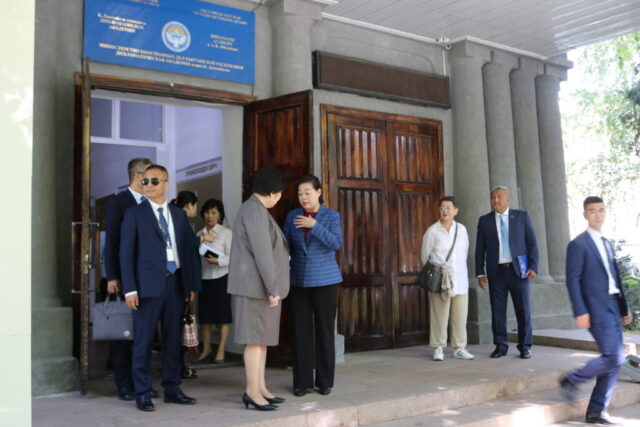Enhancing China-Kyrgyzstan Cooperation: Inauguration of Analytical Centre for China Studies

The inauguration of the Analytical Centre for China Studies in Bishkek marks a significant milestone in China-Kyrgyzstan cooperation, underscoring Beijing’s strategic approach towards the Central Asian republic and its broader ambitions to expand influence in the region through cultural diplomacy.
Information Background
On June 2nd, 2023, in Bishkek, Kyrgyzstan has made a notable stride in Central Asian Sinology with the establishment of the Analytical Centre for China Studies (ACCC). Opened at the Diplomatic Academy of the Ministry of Foreign Affairs, this think tank focuses on Chinese studies, aiming to provide analytical products and verified information on the development of modern China.
The opening of the centre received support from the Chinese side, with technical equipment provided by the Embassy of The People’s Republic of China in Kyrgyzstan. The event included a bilateral signing of the Transfer and Acceptance Certificate for the equipment, attended by Ambassador Du Dewen.
While Kyrgyzstan forges ahead with this progressive step, other Central Asian countries have not experienced similar advancements. Kazakhstan, in particular, has seen a regression in its Sinology school, losing institutional status and becoming limited to a few individuals.
In contrast, Kyrgyzstan already houses Confucius Institutes (孔子学院) at several universities, and since 2007, the Kyrgyz-Chinese educational centre, founded by President Hu Jintao, has been operational. These institutions, part of the Global Network of Confucius Institutes, promote Chinese language and culture abroad, though no other think tanks currently exist among the neighbouring Central Asian republics.
China-Kyrgyzstan Relations and Regional Dynamics
The establishment of the Analytical Centre for China Studies has the potential to strengthen ties between Bishkek and Beijing, fostering a deeper understanding and facilitating increased cooperation in politics, economy, and culture. Kyrgyzstan could emerge as a regional hub for Sinology expertise, attracting scholars, researchers, and policymakers from neighbouring countries. This could enhance the Central Asian republic’s influence and promote regional dialogue on matters related to China.
The ACCC’s provision of analytical products and verified information on modern China’s development can contribute to the expansion of knowledge and understanding of Chinese affairs in Kyrgyzstan. This may stimulate academic growth, attract students interested in Chinese studies, and foster further research collaborations and educational partnerships.
The expertise gained in Chinese studies could have implications for Bishkek’s geopolitical positioning. The insights provided by the ACCC could influence the country’s foreign policy decisions, particularly in its relations with Beijing and other regional powers.
Conclusion
The Analytical Centre for China Studies in Kyrgyzstan signifies a milestone in China-Kyrgyzstan cooperation, underlining Beijing’s strategic approach to expand influence in Central Asia through cultural diplomacy. It should be noted that in May 2023, in the city of Xi’an, Beijing organised the first “China-Central Asia” summit which emphasised the Chinese regional strategy and attempt to increase its role by supporting local investment projects linked to the Belt and Road Initiative.
As Kyrgyzstan continues to depend on Chinese investments and financial support, it is likely to strengthen its economic ties with Beijing. This could lead to a deeper Chinese influence in the country, as well as in the wider Central Asian region. China may further expand its economic projects and infrastructure development initiatives, solidifying its position as a major player in the region.
The growing presence of China in Kyrgyzstan and Central Asia could pose a challenge to Russia’s traditional influence in the region. Moscow may perceive this as a threat to its strategic interests and seek to maintain its dominance in Central Asia. This could lead to increased geopolitical competition between Russia and China, as they vie for influence and control over key economic and political aspects of the region.
Indeed, Moscow views Kyrgyzstan and Central Asia as integral to its blizhnee zarubezhe (near abroad) and lebensraum (vital space), where the Kremlin has sought to limit foreign interference since the collapse of the Soviet Union and especially during Putin’s presidency.
Therefore, Kyrgyzstan, being caught between the interests of Russia and China, may face the challenge of maintaining a delicate balance between the two powers. It will need to navigate its relations with both countries carefully, ensuring its own sovereignty and national interests are protected while leveraging the economic benefits from its ties with both Russia and China. Kyrgyzstan’s ability to successfully manage this delicate balancing act will shape its future trajectory in the region.
Author: Giuliano Bifolchi
For further information, analyses, and risk assessment on Beijing’s strategy in Central Asia and the regional geopolitical competition, do not hesitate to contact us at info@specialeurasia.com.
